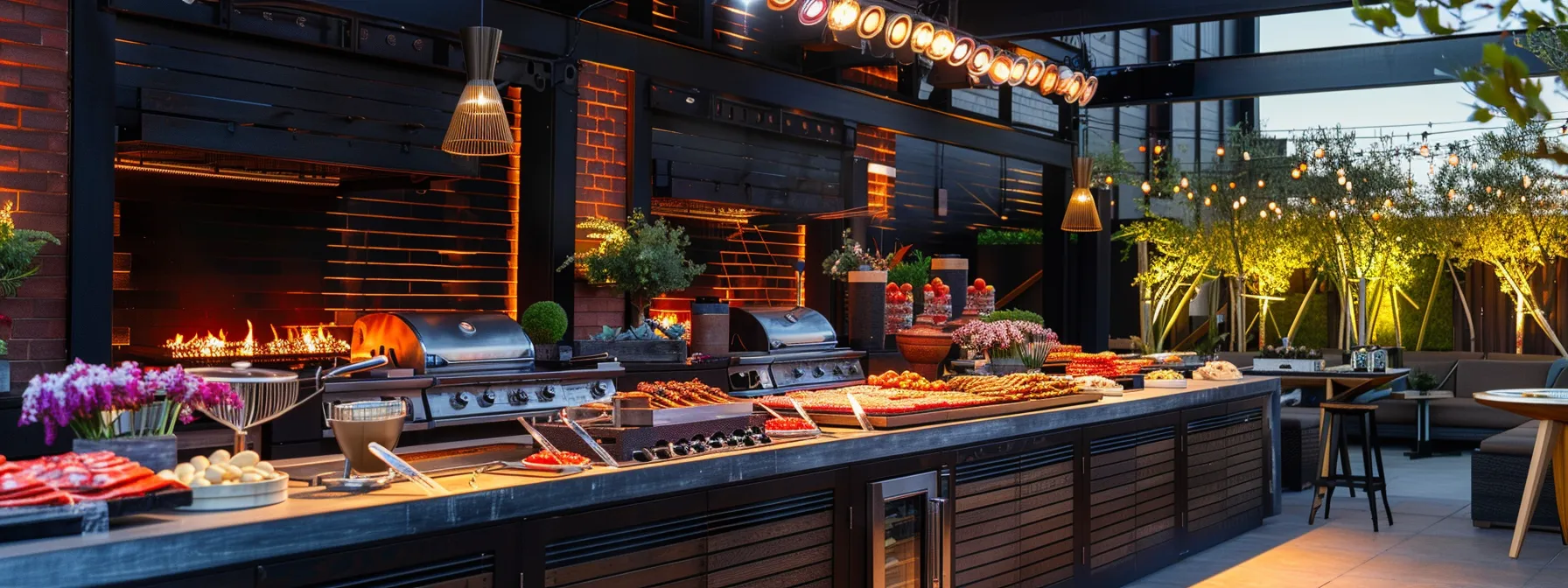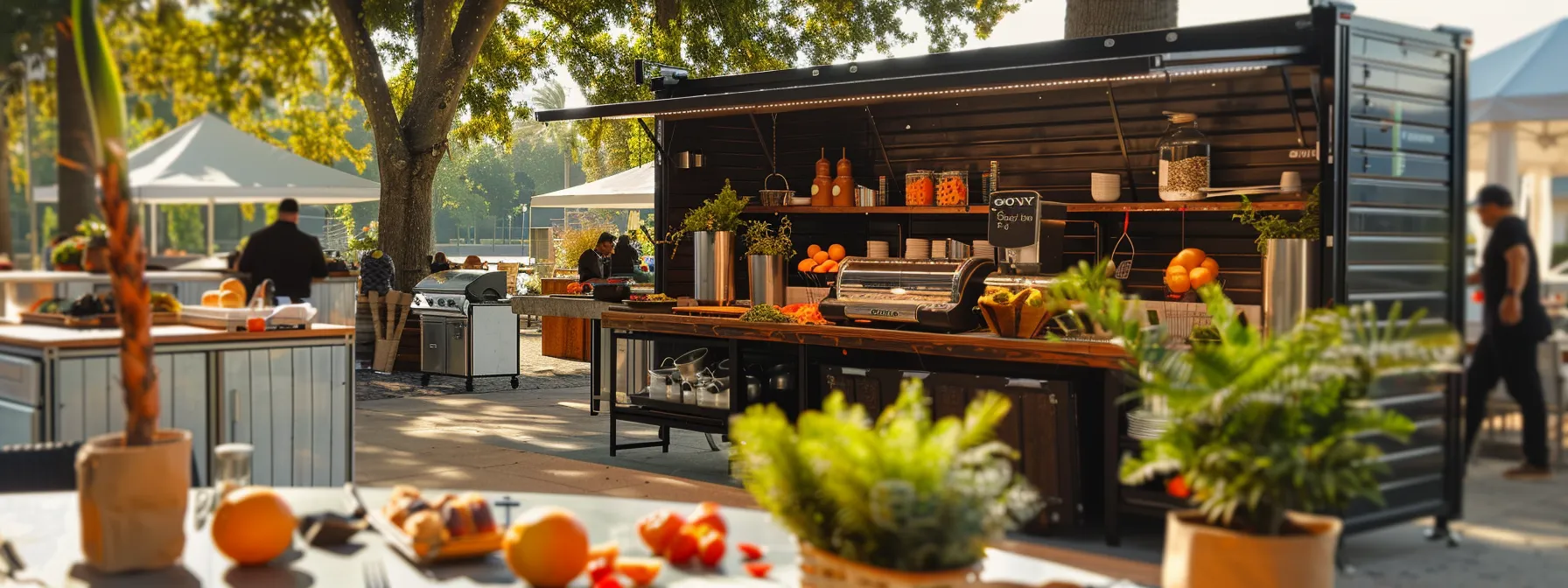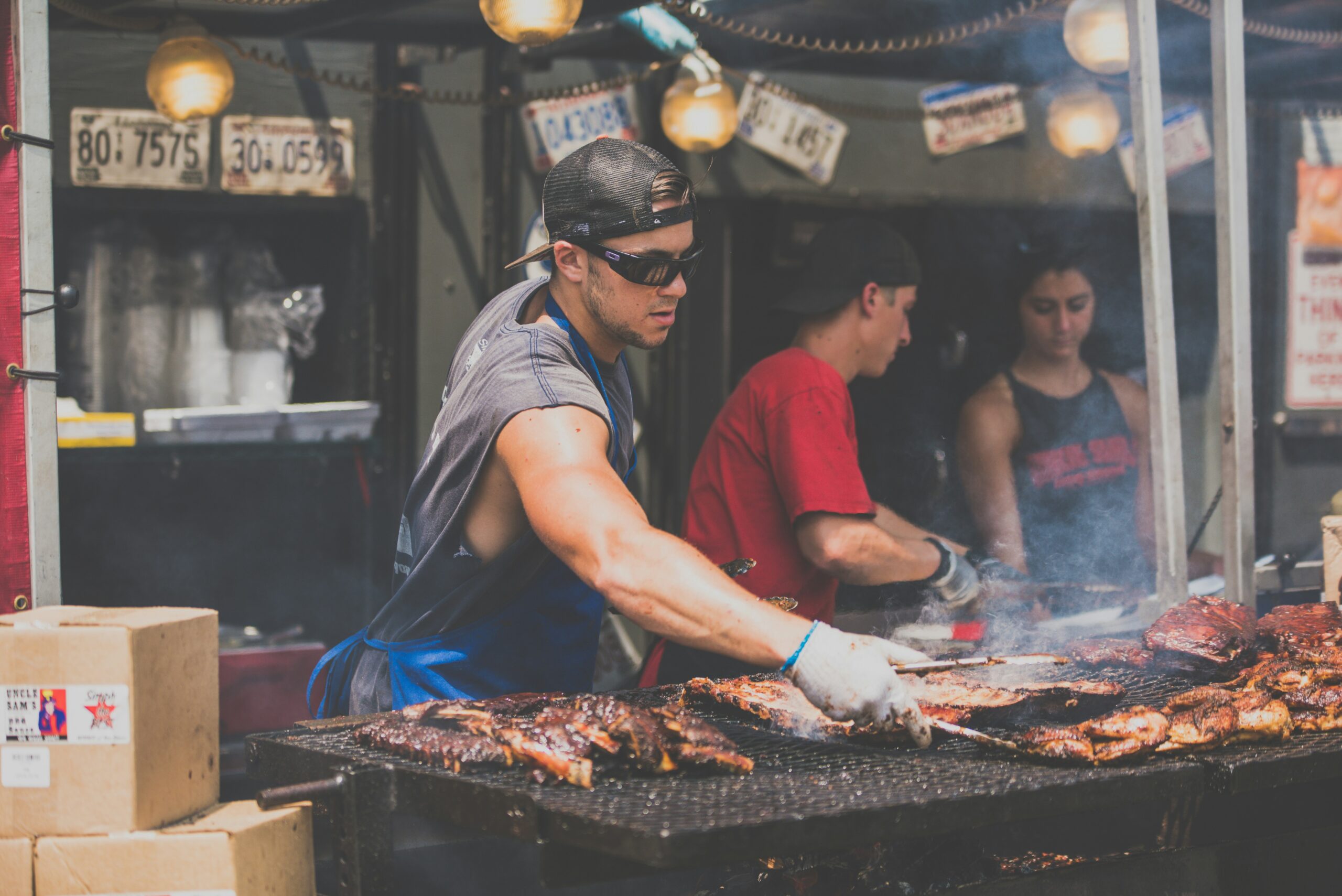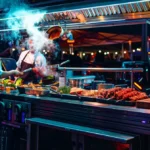Are you planning an outdoor cooking event but unsure about the essential equipment needed? This guide explores crucial BBQ grills and catering solutions for successful outdoor cooking. We’ll cover the importance of quality grills, effective catering equipment, and essential tools for creating memorable outdoor dining experiences. By the end, you’ll have a clear understanding of how to set up an efficient outdoor cooking station that’s both event-ready and guest-approved.
Key Takeaways
- Selecting the right grill type and size is crucial for successful outdoor catering events
- Essential accessories and tools enhance grilling efficiency, safety, and food quality
- Mobile kitchen solutions and proper food safety practices are vital for large outdoor gatherings
- Mastering various cooking techniques, including grilling, smoking, and seasoning, ensures diverse and flavorful menus
- Creating an engaging atmosphere and gathering feedback contribute to memorable outdoor cooking experiences
Understanding BBQ Grills and Their Importance in Outdoor Cooking

BBQ grills are essential for outdoor cooking events. This section explores various grill types, comparing charcoal, gas, and electric options. It evaluates portable grills for mobile catering and discusses choosing the right size for events. Essential accessories to enhance the grilling experience are also covered. Proper grill selection ensures efficient food preparation and transport, while countertop units and drink stations improve the overall catering setup.
Exploring the Different Types of BBQ Grills
BBQ grills come in various types, each offering unique benefits for outdoor cooking events. Charcoal grills provide a traditional smoky flavor, while gas grills offer convenience and precise temperature control. Electric grills are ideal for indoor or outdoor use where open flames are prohibited. When selecting a grill for catering, consider factors such as portability, size, and fuel type to ensure efficient food preparation and serving. Proper hygiene practices and compatible kitchen equipment are essential for maintaining food safety standards during banquet-style events.
Comparing Features of Charcoal, Gas, and Electric Grills
Charcoal, gas, and electric grills each offer unique features for outdoor cooking events. Charcoal grills provide a classic smoky flavor, ideal for enhancing the taste of grilled meals. Gas grills offer convenience and precise temperature control, allowing caterers to efficiently prepare food for large gatherings. Electric grills are perfect for indoor or outdoor use where open flames are restricted, ensuring versatility in various settings. When selecting a grill for catering, event planners should consider factors such as portability, size, and fuel type to streamline food preparation and serving. Pairing the right grill with essential tableware and a cutting board can create a complete outdoor cooking station, ready to be loaded onto a truck for mobile catering services.
Evaluating the Benefits of Portable Grills for Events
Portable grills offer significant advantages for outdoor events, combining mobility with cooking power. These compact units, often equipped with casters for easy transport, can run on natural gas or propane, providing flexibility in fuel options. Event planners can create versatile cooking stations by pairing portable grills with carts for sautéing and beverage service, enhancing the overall catering experience.
Choosing the Right Grill Size for Your Outdoor Events
Selecting the appropriate grill size is crucial for successful outdoor events. Event planners must consider the number of guests, the types of meat to be cooked, and the available patio space. Larger grills allow for simultaneous cooking of various dishes, reducing wait times and ensuring a steady flow of food. For smoky flavors, separate smoking units can complement the main grill, enhancing the culinary experience. Event organizers should also factor in personal protective equipment for staff operating the grills during outdoor gatherings.
Essential Accessories to Enhance Your Grilling Experience
Essential accessories elevate the grilling experience at catered events. Stainless steel utensils, trays, and fuel canisters are indispensable for efficient food preparation and service. Event planners should equip their outdoor cooking stations with high-quality thermometers, grill brushes, and heat-resistant gloves to ensure safety and hygiene. The right equipment enhances performance and streamlines operations during busy outdoor gatherings:
- Stainless steel utensils and trays
- Fuel canisters for consistent heat
- Thermometers for precise cooking
- Grill brushes for cleaning
- Heat-resistant gloves for safety
Catering Solutions for Outdoor Cooking Events

Outdoor catering events require specialized equipment and strategies. From essential tools like cream dispensers to mobile kitchen solutions, caterers must prioritize food safety and efficient setup. Menu planning and equipment selection, including beer dispensers and linen, are crucial for success. This section explores key aspects of outdoor catering, ensuring smooth operations and guest satisfaction.
Necessary Equipment for Outdoor Catering
Outdoor catering requires specialized equipment to ensure smooth operations and guest satisfaction. Essential items include portable BBQ grills, food storage containers, and serving ware made of durable materials like porcelain. Event planners must also consider furniture for guest comfort and wine dispensers for beverage service. A well-equipped catering vehicle stocked with the necessary ingredients and tools is crucial for transporting everything to the event site efficiently.
Utilizing Mobile Kitchen Solutions for Large Gatherings
Mobile kitchen solutions revolutionize large outdoor events by bringing professional cooking capabilities to any location. These versatile units often include essential equipment like racks, rotisseries, and chef-grade appliances, enabling caterers to create a diverse menu that matches the event’s atmosphere. By utilizing mobile kitchens, event planners can efficiently serve large gatherings while maintaining food quality and safety standards:
| Mobile Kitchen Component | Function | Benefit |
|---|---|---|
| Rack System | Organized storage | Efficient use of space |
| Rotisserie | Even cooking | Versatile menu options |
| Chef-grade Appliances | Professional cooking | High-quality food preparation |
Best Practices for Food Safety in Outdoor Catering
Maintaining food safety during outdoor catering events requires meticulous attention to detail. Event planners must ensure proper temperature control using reliable thermometers for both hot and cold dishes. A portable stove or charbroiler should be equipped with accurate temperature gauges to prevent undercooking. Proper food handling practices, including frequent hand washing and the use of clean utensils, are essential to prevent contamination. Caterers should also consider displaying food safety certifications as part of their advertising to build customer trust and demonstrate their commitment to safe practices.
Planning Your Menu for Outdoor Events
Event planners must carefully design menus for outdoor gatherings, considering equipment limitations and food safety. A well-planned menu might include grilled items, chilled desserts like cake, and side dishes that can withstand outdoor temperatures. Caterers should use ovens with precise temperature controls to ensure proper cooking and prevent contamination. For added ambiance, bamboo serving platters and patio heaters can enhance the dining experience while keeping guests comfortable.
How to Set Up an Efficient Outdoor Cooking Station
Setting up an efficient outdoor cooking station requires careful planning and the right equipment. Event planners should position a reliable propane-fueled BBQ grill as the centerpiece, ensuring it has a unique SKU for easy identification. A nearby dishwasher unit can handle service supplies, maintaining cleanliness throughout the event. For versatility, a pellet grill can be added to offer diverse cooking options and flavors, enhancing the overall culinary experience for guests.
Outdoor Cooking Techniques for BBQ and Catering
Outdoor cooking techniques for BBQ and catering events require mastery of grilling, smoking, and seasoning methods. Event planners must consider equipment like charcoal grills, fuel storage tanks, and hot plates for side dishes. Proper timing and preparation of meats, vegetables, and marinades are essential for serving large groups. These techniques, combined with the right plastic utensils and storage solutions, ensure successful outdoor culinary experiences.
Mastering Grilling Techniques for Perfectly Cooked Meats
Mastering grilling techniques ensures perfectly cooked meats for outdoor events. Event planners should use a high-quality cooktop with precise temperature control for consistent results. Proper cutlery selection aids in efficient meat preparation and presentation. Cooking methods like direct heat for steaks and convection for larger cuts optimize flavor and texture. Understanding heat zones on the grill surface allows for simultaneously cooking different meats to perfection.
Incorporating Smoking Methods for Added Flavor
Incorporating smoking methods enhances the flavor profile of outdoor cooking. Event planners can utilize wood chips or pellets in specialized smokers or adapted grills to infuse meats with rich, smoky notes. Proper food storage techniques ensure that smoked items maintain their quality throughout the event. Caterers often pair smoking with boiling methods, using a portable sink for preparation and cleanup to create a diverse menu that maximizes available supplies and equipment.
Preparing Sides and Vegetables on the Grill
Grilling sides and vegetables adds depth to outdoor catering menus. Event planners can utilize the grill’s heat zones to cook various vegetables simultaneously, ensuring optimal texture and flavor. A glass-covered area near the grill protects prepared sides from the elements, while a cooler with ice keeps salads and cold dishes fresh. Grilling techniques such as skewering or using foil packets enhance the presentation and cooking process for vegetables, creating a diverse and appealing spread for guests.
The Role of Marinades and Seasonings in BBQ
Marinades and seasonings play a crucial role in BBQ, enhancing flavors and tenderizing meats. Event planners often use steel containers to prepare and store these flavor-boosting mixtures. Roasting techniques combined with well-crafted marinades create depth in taste profiles. Caterers may use a mailing list to share recipe ideas and cooking tips with clients. Proper water management is essential when using marinades to ensure food safety:
| Marinade Component | Function | Example |
|---|---|---|
| Acid | Tenderizes meat | Vinegar, citrus juice |
| Oil | Moisture retention | Olive oil, vegetable oil |
| Herbs and Spices | Flavor enhancement | Rosemary, garlic, paprika |
Timing Your Cooking for Large Groups
Timing cooking for large groups at catered events requires precise planning and efficient use of equipment. Event planners often use a refrigerator to store prepped ingredients, allowing for quick assembly on the griddle when needed. A wood-fired grill can add unique flavors while a marketing strategy that highlights the chef’s timing skills can attract more clients. Proper scheduling ensures that hot dishes are served fresh and cold items remain chilled, maximizing guest satisfaction.
Essential Tools and Equipment for Outdoor Cooking Events
Outdoor cooking events require specific tools and equipment for success. From selecting appropriate utensils to understanding fuel options, event planners must consider various aspects. This section explores essential items for food preparation and serving, emphasizing the importance of cleaning tools and suitable cookware. Commercial outdoor grills, sanitation practices, and customer service are key factors in ensuring a smooth catering experience.
Selecting the Right Cooking Utensils and Tools
Selecting the right cooking utensils and tools is crucial for successful outdoor catering events. Event planners should choose high-quality, durable items that can withstand the rigors of outdoor use. Stainless steel utensils are ideal for their durability and ease of cleaning. A well-equipped catering kitchen should include a variety of spatulas, tongs, and serving spoons. Food service professionals often recommend investing in rated catering equipment to ensure reliability and compliance with industry standards. Essential items for outdoor cooking events include:
- Heat-resistant gloves
- Long-handled utensils for safe grilling
- Sturdy platters for food presentation
- Thermometers for accurate temperature control
- Cutting boards for food preparation
Must-Have Items for Food Preparation and Serving
Event planners must equip their outdoor cooking stations with essential items for food preparation and serving. A well-stocked food truck or trailer serves as a mobile kitchen, housing commercial-grade equipment for efficient meal production. Caterers should include versatile serving platters suitable for various menu items, from savory grilled dishes to sweet cupcakes. Proper storage solutions ensure food safety and quality throughout the event, while display cases showcase the menu offerings attractively.
Navigating Fuel Options for Outdoor Grilling Equipment
Event planners must consider various fuel options when selecting outdoor grilling equipment. Propane and natural gas offer convenience and consistent heat, ideal for large-scale barbecue events. Charcoal provides a traditional flavor, enhancing the taste of grilled foods. For versatility, some caterers opt for dual-fuel grills that accommodate both gas and charcoal. When planning the outdoor cooking space, it’s essential to factor in fuel storage and accessibility. Portable woks and baking equipment can complement the main grill, expanding menu options for diverse events:
- Propane tanks for mobility
- Natural gas lines for permanent setups
- Charcoal for authentic barbecue flavor
- Dual-fuel grills for flexibility
- Portable cooking equipment for varied menu items
Importance of Cleaning and Maintenance Tools
Cleaning and maintenance tools are essential for ensuring the longevity and hygiene of outdoor cooking equipment. Event planners must invest in high-quality grill brushes, scrapers, and degreasers to keep grills in top condition. Regular cleaning after each use prevents the buildup of grease and food particles, which can affect food quality and pose health risks. A well-maintained grill not only performs better but also enhances the overall catering experience:
- Grill brushes for removing debris
- Scrapers for stubborn residue
- Degreasers for thorough cleaning
- Microfiber cloths for polishing surfaces
- Sanitizing solutions for food-safe cleaning
Understanding Different Cookware for Grilling
Different cookware options enhance grilling versatility for outdoor events. Cast iron skillets retain heat well, perfect for searing meats or cooking side dishes directly on the grill. Stainless steel grill baskets allow for easy grilling of smaller items like vegetables or seafood. Planks made from cedar or other aromatic woods impart unique flavors to fish and poultry. Event planners should consider these cookware options to expand their menu offerings:
- Cast iron skillets for heat retention
- Stainless steel grill baskets for small items
- Wood planks for flavor infusion
- Grill-safe baking dishes for desserts
- Heat-resistant silicone mats for delicate foods
Creating a Memorable Outdoor Cooking Experience

Creating a memorable outdoor cooking experience involves more than just great food. Event planners must focus on atmosphere, guest engagement, efficient cleanup, feedback collection, and culinary skill showcasing. From setting the right ambiance to involving guests in cooking activities, each aspect contributes to a successful event. Proper planning ensures smooth operations and guest satisfaction, while gathering feedback helps improve future gatherings.
Setting the Atmosphere for Outdoor Gatherings
Setting the right atmosphere for outdoor gatherings enhances the overall cooking experience. Event planners can create an inviting ambiance by using strategically placed lighting, such as string lights or lanterns, to illuminate the cooking and dining areas. Comfortable seating arrangements, including cushioned chairs and picnic blankets, encourage guests to relax and enjoy the event. Background music, carefully selected to match the event’s theme, adds to the festive atmosphere while not overpowering conversations.
Tips for Engaging Guests in Cooking Activities
Engaging guests in cooking activities creates an interactive and memorable outdoor experience. Event planners can set up DIY stations where guests assemble their own tacos or build custom salads, fostering participation and customization. Offering grilling demonstrations allows attendees to learn new techniques, while organizing friendly cooking competitions adds excitement to the gathering. These activities not only entertain but also educate guests, making the event more engaging and enjoyable:
- DIY food assembly stations
- Grilling demonstrations
- Cooking competitions
- Herb and spice blending workshops
- Marinading masterclasses
Strategies for Efficient Cleanup After Events
Efficient cleanup strategies are essential for successful outdoor cooking events. Event planners should establish a designated cleanup area with waste sorting stations, making it easy for guests to dispose of their trash properly. Using disposable yet eco-friendly tableware can significantly reduce cleanup time while maintaining environmental responsibility. Caterers often employ a systematic approach to breakdown and packing, ensuring all equipment is cleaned, sanitized, and stored correctly for future use:
- Set up waste sorting stations
- Use eco-friendly disposable tableware
- Implement a systematic breakdown process
- Clean and sanitize equipment on-site
- Pack items efficiently for transport
Gathering Feedback to Improve Future Outdoor Events
Gathering feedback after outdoor cooking events is crucial for continuous improvement. Event planners can use digital surveys or comment cards to collect guests’ opinions on food quality, service, and overall experience. Analyzing this feedback helps identify areas for enhancement, such as menu adjustments or equipment upgrades. Caterers often incorporate suggestions into future events, ensuring they meet and exceed client expectations.
Showcasing Your Culinary Skills in Outdoor Settings
Outdoor settings provide unique opportunities for caterers to showcase their culinary skills. Event planners can create live cooking stations where chefs prepare dishes in front of guests, demonstrating techniques and engaging in conversations about ingredients and preparation methods. Using high-quality outdoor cooking equipment, such as professional-grade grills and smokers, allows caterers to execute complex recipes with precision, impressing clients with restaurant-quality meals in open-air venues. By incorporating local, seasonal ingredients and highlighting regional cooking styles, chefs can create memorable dining experiences that reflect the event’s location and atmosphere.
Conclusion
BBQ grills and catering solutions are essential for creating successful outdoor cooking events, offering versatility and efficiency in food preparation. From selecting the right grill type to incorporating essential accessories and mobile kitchen solutions, event planners can ensure smooth operations and guest satisfaction. Proper equipment selection, coupled with mastery of outdoor cooking techniques and food safety practices, enables caterers to deliver high-quality meals in various settings. By focusing on creating memorable experiences through engaging activities and showcasing culinary skills, event professionals can elevate outdoor gatherings, leaving lasting impressions on guests and clients alike.






